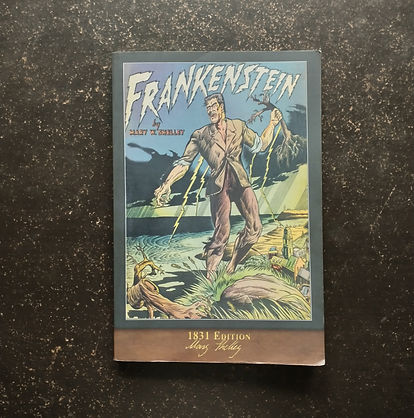
Frankenstein-Mary Shelley
Everyone has a bit of Frankenstein lingering within their soul when the hooks of loneliness latch onto the psyche and begin to tug.
That feeling of being an outcast to society.
I know I have felt this in the past, and, at times, continue to feel this way. Especially after my accident last year when I was thrust back into the pedestrian life once again. I still recall that first week, after I had to return my rental car and then was walking up to the library, my temporary vocation of door dashing now gone and without a clue as to what I would do to make ends meet. It was extremely depressing. I felt as if I had missed the boat whereas everyone else packed gumption enough to heed the final boarding call and not be left stranded. With every step, the pain was aggrandized. People passed me by on their way to work, indifferent to my plight. Almost as if to say, "Sorry about your luck. But perhaps you should've thought about scenarios like this before quitting."
The same can be applied to those who seem to glide into long-term relationships with ease. Granted, I've had my short terms that were full of fulfillment, as well as some that were equally filled with regret and frustrations. But, for the largest portion of my life, I have remained single.
Then you can also point to the financial realm of life and feel like a Frankenstein. For myself, I am currently in a rare state of residence squarely in the black. But my barometer of satisfaction is more than likely set at a lower level than most folks. If I were to make a bold confession, the inspiration of Tully driving down Lake Road, hissing resentful obscenities at the mansions blocking Lake Erie is partly based upon my sentiments of envy at those who had reached levels of achievement that, even in my wildest fantasies, I couldn't even begin to comprehend.
Yes, when the ease of ebbing and flowing through the channels of life appears to elude you at every step while the rest of the world seems bereft of such problems, it can make you feel like a Frankenstein.
***
The legacy of this book easily transfers beyond the realm of Horror. Truth be told—and, maybe because I am desensitized to the butchering of human anatomy—this story felt more like a fictional drama, or Shakespearean tale than it did a Horror novel. It was obvious that Mary Shelley was well acquainted with pain. Her prose was so incredibly skilled at capturing a sense of loss that it is difficult for me, at this moment, to think of a rival.
As the novel progressed and the focus shifted from Victor Frankenstein to the inaccurately titled "Frankenstein" or, demon, or fiend, it became difficult to decipher who the real villain was in the story. From birth, the demon was forsaken and left to his upbringing. As is the case with human nature, the natural tendencies of benevolence, love, and goodwill are embedded with the fiend and he desperately seeks companionship with his fellow man—only to be rejected at greater and greater heights, all of which served to increase the sting.
The irony of extreme pushback from those he had invested such grandiose amounts of affection for erodes the feelings of goodwill and molds them into envy, revenge, and wrath. And without compunction, he begins to wield his sword of pain at Victor, his creator, and gains a sense of satisfaction in watching Victor suffer the consequences of loss and fear. All of this while constantly lamenting the fact that, no matter how heinous the crime, nor how incredible the sorrow that remains in its wake, it is nothing compared to the pain of existence the fiend has always known.
I don't think there is a soul alive who cannot relate at times to the immense strain isolation can bring on an individual. With Frankenstein, this feeling of isolation is provided an engine and then given an open lane bereft of any impediments. There are few rocks left unturned by the conclusion of the story. We as the audience are made privy to the fate of both the demon and Victor. The only true question that remains as this sad story comes to a close, is to ponder who the real villain of the story is.
For me, who seeks to view all lessons in life through a Holy lens, I feel as if punishment was metered out for both Victor and his creation accordingly.
Much like how God allowed Judas to exist and accept Satan's invitation to eternal damnation, as he was integral to the gospels, I believe there was no other fate for the demon besides the path he was set up on and the destination he arrived at. In my opinion, his calloused existence was almost pre-ordained from his false birth. Everything that he experienced was designed as a just punishment for Victor.
And as for Victor, well…I must refer to my favorite slice of scripture: "Do not deceive yourselves; no one makes a fool of God. A person will reap exactly what he plants. If he plants in the field of natural desires, from this he will gather the harvest of death; if he plants in the field of the Spirit, from the Spirit he will gather the harvest of eternal life." Galatians 6:7
Just ask Karl Marx about what God thinks of those who attempt to imitate His likeness. Whether it is plagiarising scripture to twist semantics for one's gain or trying to reinvent the design of man to satisfy the craving for curiosity, one thing can be sure: God always gets the final say. So for dabbling in these forbidden waters, Victor pretty much got what he deserved.
Amazing book. There is a reason its legacy is so revered.
Grade: A
Verdict: Read